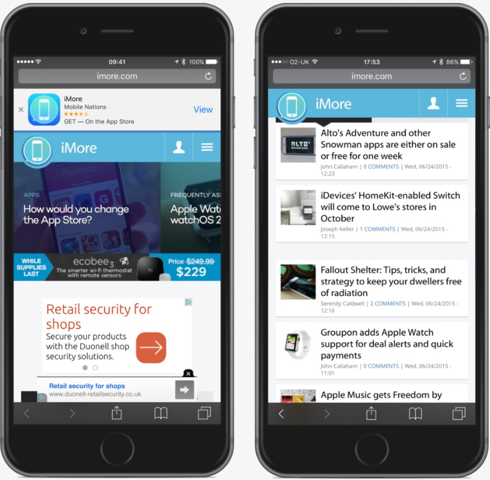
[/responsive] Before (left) – with ads, After (right) – without ads & bloat
It won’t be long now.
The ad blocking revolution is getting closer by the day. What it means for the industry continues to be the subject of intense debate. Alarmists claim this could kill the free Web, while calmer voices say this will help with the so-called web-page “bloat” that is ruining user experience.
But what exactly is this “bloat,” and where is it coming from? Jean-Louis Gassée in Monday Note does a great job of explaining just what users stand to gain (and advertisers lose) if mobile users flock to content blocking apps.
First off, it’s important to note that iOS 9 doesn’t include built-in ad blockers. Apple is supporting the idea of ad blockers by “making room,” if you will, for indie developers to create and offer them to Apple users.
“You may quibble with the use of ‘independent’ — the App Store judges will intervene, as usual — but we should expect a flurry of creative ad-blocking code followed by a round of noisy arguments accusing developers of attempting to destroy barely solvent Web publishers,” Gassée explains.
The real story, Gassée insists, is in the potentially dramatic change to user experience, noting that many opposing voices “disregarded the benefits of Content Blocking for mere users, the unwashed masses who supply the industry with their life-giving fluids of money and personal data.”
It’s that mountain of personal data – just waiting to be mined – that’s behind this phenomenon of bloat.
“Web publishers insert gratuitous chunks of code that let advertisers vend their wares and track our every move, code that causes pages to stutter, juggle, and reload for no discernible reason. Even after the page has settled into seeming quiescence, it may keep loading unseen content in the background for minutes on end,” Gassée notes.
In other words, it’s not your phone or your service provider that is causing the holdup when you load a page; it’s the enormous amount of extra information being loaded with every click you make.
We were shocked to learn just how much data this is. Gassée references one blogger who discovered “263 HTTP requests and 9.5MB needed to load the page.” Another blogger noted 6 MBs of data loading for 8KB of actual content, a ratio of almost 1000:1.
That’s wild. Some argue that smaller publishers need access to this data to survive, that we should just accept that this is the way the Web works. Others are more circumspect, including Charles Arthur who notes in his post:
“Have I any responsibility to [the advertisers]? Well, not really. Certainly as a standard reader, here’s what happened: I accepted an invitation to read an article, but I don’t think that we quite got things straight at the top of the page over the extent to which I’d be tracked, and how multiple ad networks would profile me, and suck up my data allowance, and interfere with the reading experience. Don’t I get any say in the last two, at least?”
Ad for ad and content blockers, the industry has brought this on themselves. If digital ads are so ineffective that marketers must resort to gold digging to keep the lights on, they’re doing it wrong.
